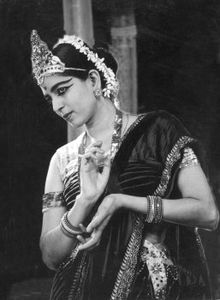Rukmini Arundale
| Rukmini Devi Arundale | |
|---|---|
 |
|
| Born |
Rukmani Arundale 29 February 1904 Madurai, Madras Presidency, British India |
| Died | 24 February 1986 (aged 81) Chennai, Tamil Nadu, India |
| Years active | 1920-1986 |
| Spouse(s) | George Arundale (m 1920) |
| Awards |
Padma Bhushan: 1956 Sangeet Natak Akademi Fellowship: 1967 |
Rukmini Devi Arundale (29 February 1904 – 24 February 1986) was an Indian theosophist, dancer and choreographer of the Indian classical dance form of Bharatanatyam, and an activist for animal rights and welfare.
She is considered the most important revivalist in the Indian classical dance form of Bharatanatyam from its original 'sadhir' style, prevalent amongst the temple dancers, Devadasis, she also worked for the re-establishment of traditional Indian arts and crafts.
Though she belonged to the Indian upper-caste she espoused the cause of Bharata Natyam, which was considered a low and vulgar art in the early 1920s. Recognising the beauty and the spiritual value of this art form, she not only learned the dance, but also presented it on stage despite strong public protests.
Rukmini Devi features in India Today's list of '100 People Who Shaped India'. She was awarded the Padma Bhushan in 1956, and Sangeet Natak Akademi Fellowship in 1967.
Rukmini Devi was born on 29 February 1904 in a Brahmin family in Madurai. Her father Neelakanta Sastri was an engineer with the Public Works Department and a scholar, and Seshammal was a music enthusiast. He had a transferable job and the family moved frequently. He was introduced to the Theosophical Society in 1901. Deeply influenced by the Theosophical Movement as a follower of Dr Annie Besant, Neelakanta Sastri moved to Adyar, Chennai upon retirement, where he built his home near the headquarters of the Theosophical Society Adyar. It was here that young Rukmini was exposed to not just theosophical thought, but also new ideas on culture, theatre, music and dance, and later met the prominent British theosophist Dr George Arundale, who was a close associate of Annie Besant and later the principal of the Central Hindu College in Varanasi, and soon build a lasting bond with him.
...
Wikipedia
